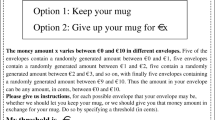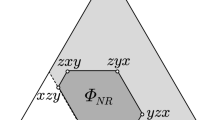Abstract
The random lottery incentive system is widely used in experimental economics to motivate subjects. This paper investigates its validity. It reports three experiments which compare responses given to decision tasks which are embedded in random lottery designs with responses in 'single choice' designs in which each subject faces just one task for real. The experiments were designed to detect cross-task contamination effects in the random lottery treatment. No significant differences between treatments, and no significant contamination effects, were found. Over the three experiments, observed differences between the treatments are adequately explained as sampling variation.
Similar content being viewed by others
References
Allais, M. (1953). “Le Comportement de L'homme Rationnel Devant le Risque: Critique des Postulats et Axiomes de L'école Américaine.” Econometrica. 21, 503-546.
Battalio, R.C., Kagel, J.H., and Jiranyakul, K. (1990). “Testing Between Alternative Models of Choice Under Uncertainty: Some Initial Results.” Journal of Risk and Uncertainty. 3, 25-50.
Beattie, J. and Loomes, G. (1997). “The Impact of Incentives Upon Risky Choice Experiments.” Journal of Risk and Uncertainty. 14, 149-162.
Bernasconi, M. (1994). “Nonlinear Preferences and Two-Stage Lotteries.” Economic Journal. 104, 54-70.
Camerer, C. (1989). “An Experimental Test of Several Generalized Expected Utility Theories.” Journal of Risk and Uncertainty. 2, 61-104.
Camerer, C. (1995). “Individual Decision Making.” In John Kagel and Alvin Roth (eds.). Handbook of Experimental Economics. Princeton, NJ: Princeton University Press, chap. 8.
Conlisk, J. (1989). “Three Variants on the Allais Example.” American Economic Review. 79, 392-407.
Davis, D.D. and Holt, C.A. (1993). Experimental Economics. Princeton, NJ: Princeton University Press.
Harrison, G.W. (1994). “Expected Utility Theory and the Experimentalists.” Empirical Economics. 19, 223-253.
Hirshleifer, J. and Riley, J.G. (1992). The Analytics of Uncertainty and Information. Cambridge: Cambridge University Press.
Holt, C.A. (1986). “Preference Reversals and the Independence Axiom.” American Economic Review. 76, 508-515.
Kahneman, D. and Tversky, A. (1979). “Prospect Theory: An Analysis of Decision Under Risk.” Econometrica. 47, 263-291.
Machina, M. (1982). “Expected Utility Analysis Without the Independence Axiom.” Econometrica. 50, 277-323.
Smith, V.L. (1982). “Microeconomic Systems as an Experimental Science.” American Economic Review. 72, 923-955.
Starmer, C. (1992). “Testing New Theories of Choice Under Uncertainty Using the Common Consequence Effect.” Review of Economic Studies. 59, 813-830.
Starmer, C. and Sugden, R. (1989). “Probability and Juxtaposition Effects: An Experimental Investigation of the Common Ratio Effect.” Journal of Risk and Uncertainty. 2, 159-178.
Starmer, C. and Sugden, R. (1991). “Does the Random-Lottery Incentive System Elicit True Preferences? An Experimental Investigation.” American Economic Review. 81, 971-978.
Tversky, A. and Kahneman, D. (1981). “The Framing of Decisions and the Psychology of Choice.” Science. 211, 453-458.
Wilcox, N.T. (1993). “Lottery Choice: Incentives, Complexity and Decision Time.” Economic Journal. 103, 1397-1417.
Author information
Authors and Affiliations
Rights and permissions
About this article
Cite this article
Cubitt, R.P., Starmer, C. & Sugden, R. On the Validity of the Random Lottery Incentive System. Experimental Economics 1, 115–131 (1998). https://doi.org/10.1023/A:1026435508449
Issue Date:
DOI: https://doi.org/10.1023/A:1026435508449




